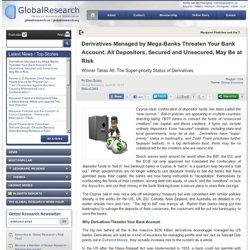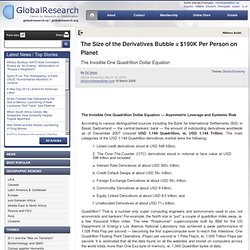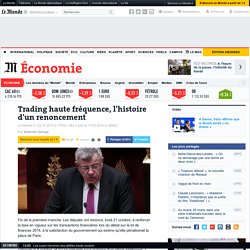

Derivatives Managed by Mega-Banks Threaten Your Bank Account. All Depositors, Secured and Unsecured, May Be at Risk. Cyprus-style confiscation of depositor funds has been called the “new normal.”

Bail-in policies are appearing in multiple countries directing failing TBTF banks to convert the funds of “unsecured creditors” into capital; and those creditors, it turns out, include ordinary depositors. Even “secured” creditors, including state and local governments, may be at risk. Derivatives have “super-priority” status in bankruptcy, and Dodd Frank precludes further taxpayer bailouts.
In a big derivatives bust, there may be no collateral left for the creditors who are next in line. Shock waves went around the world when the IMF, the EU, and the ECB not only approved but mandated the confiscation of depositor funds to “bail in” two bankrupt banks in Cyprus. The Cyprus bail-in was not a one-off emergency measure but was consistent with similar policies already in the works for the US, UK, EU, Canada, New Zealand, and Australia, as detailed in my earlier articles here and here . . . . . . . . . .
Derivatives are Destroying the Real Economy: Michel Chossudovsky. Press TV has conducted an interview with Professor Michel Chossudovsky, economic analyst and researcher with the Center for Research on Globalization, Montreal about the issue of the widening gap between the richest in society and the poorest globally.

“It is not production and trade, which is the source of enrichment; It is manipulation and fraud at a global stage. We’re dealing with institutionalized theft, which is embedded in the financial system. It is not what we might describe as capital accumulation from a productive process, nor is it through work performed by these wealthy people.” The Size of the Derivatives Bubble = $190K Per Person on Planet. The Invisible One Quadrillion Dollar Equation — Asymmetric Leverage and Systemic Risk According to various distinguished sources including the Bank for International Settlements (BIS) in Basel, Switzerland — the central bankers’ bank — the amount of outstanding derivatives worldwide as of December 2007 crossed USD 1.144 Quadrillion, ie, USD 1,144 Trillion.

The main categories of the USD 1.144 Quadrillion derivatives market were the following: 1. Listed credit derivatives stood at USD 548 trillion;2. The Over-The-Counter (OTC) derivatives stood in notional or face value at USD 596 trillion and included:a. Quadrillion? Whilst outstanding derivatives are notional amounts until they are crystallised, actual exposure is measured by the net credit equivalent. 1. 2. Stop banks increasing food prices: limit commodity speculation & prevent a global food crisis. Banks are earning huge profits from betting on food prices in unregulated financial markets.

This creates instability and pushes up global food prices, making poor families around the world go hungry and forcing millions into deeper poverty. What is the problem? Big investment banks are betting on the price of staple foods, like wheat, maize and soya. This is causing food prices to rise and making people go hungry. Read more What is being done? WDM is campaigning to put pressure on the UK government to back European proposals regulating betting on food prices in financial markets. Find out more Regulation timeline A timeline outlining the legislative process for the Markets in Financial Instruments Directive which contains proposals to regulate food speculation.
Chypre : un plan bien pensé, un pays ruiné… Surviving Progress - Full Documentary. Jihoh. Noire Finance : La Grande Pompe à phynances. Noire finance part 2 : Le bal des vautour. Jeux de pouvoirs. Dr CAC - Le partage, est-ce une économie d'avenir ? Comment les ordinateurs ont pris possession des marchés financiers. « La Bourse et la Vie » Trading haute fréquence, l'histoire d'un renoncement. Le Monde.fr | • Mis à jour le | Par Mathilde Damgé Fin de la première manche.

Les députés ont renoncé, lundi 21 octobre, à renforcer la taxe en vigueur sur les transactions financières lors du débat sur la loi de finances 2014, à la satisfaction du gouvernement qui estime qu'elle pénaliserait la place de Paris. L'amendement 240, voté par la commission des finances de l'Assemblée nationale le 8 octobre, et qui se présente sous la forme d'un article additionnel, a été retiré par le rapporteur de la commission, le député (PS) Christian Eckert, qui en était l'auteur. Il étendait le champ d'application de la taxe (de 0,2 %) aux transactions dites "intraday" – c'est-à-dire commencées et débouclées dans la même journée – avec pour but, selon ses partisans, d'augmenter les recettes de l'Etat, et surtout de dissuader les spéculateurs. M. "La liquidité de la place financière sera amputée de 40 %", a aussi alerté Bernard Cazeneuve.